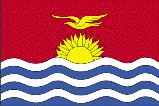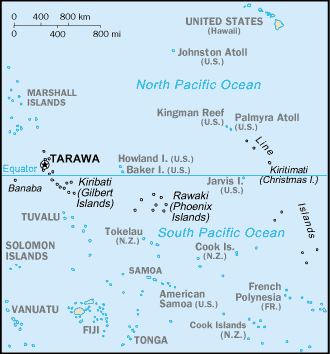|
Kiribati
|

|
Capital: Tarawa
Population: 117,606
Brief History of Kiribati:
Kiribati is an island nation in the Pacific Ocean. It was first settled by the I-Kiribati people around 1000AD. The first Europeans arrived on the island in the 1500s, but it wasn't until the 1800's that they began to arrive in larger numbers. At this time they introduced diseases and caused local conflicts. The British took control of the islands 1892, which were called the Gilbert Islands at the time. They became an official British colony in 1916.
During World War II, Japan gained control of some of the islands. Some of the fiercest fighting of the south pacific occurred on Tarawa Atoll when the United States fought the Japanese in what was a turning point in the war.
In 1979 Kiribati became a fully independent country. The first president of Kiribati was Ieremia Tabai.
The Geography of Kiribati
Total Size: 811 square km
Size Comparison: four times the size of Washington, DC
Geographical Coordinates: 1 25 N, 173 00 E
World Region or Continent: Oceania
General Terrain: mostly low-lying coral atolls surrounded by extensive reefs
Geographical Low Point: Pacific Ocean 0 m
Geographical High Point: unnamed location on Banaba 81 m
Climate: tropical; marine, hot and humid, moderated by trade winds
Major cities: TARAWA (capital) 43,000 (2009)
The People of Kiribati
Type of Government: republic
Languages Spoken: I-Kiribati, English (official)
Independence: 12 July 1979 (from UK)
National Holiday: Independence Day, 12 July (1979)
Nationality: I-Kiribati (singular and plural)
Religions: Roman Catholic 52%, Protestant (Congregational) 40%, some Seventh-Day Adventist, Muslim, Baha'i, Latter-day Saints, Church of God (1999)
National Symbol: frigatebird
National Anthem or Song: Teirake kaini Kiribati (Stand Up, Kiribati)
Economy of Kiribati
Major Industries: fishing, handicrafts
Agricultural Products: copra, taro, breadfruit, sweet potatoes, vegetables; fish
Natural Resources: phosphate (production discontinued in 1979)
Major Exports: copra 62%, coconuts, seaweed, fish
Major Imports: foodstuffs, machinery and equipment, miscellaneous manufactured goods, fuel
Currency: Australian dollar (AUD)
National GDP: $599,000,000
** Source for population (2012 est.) and GDP (2011 est.) is CIA World Factbook.
Back to Geography Home Page
